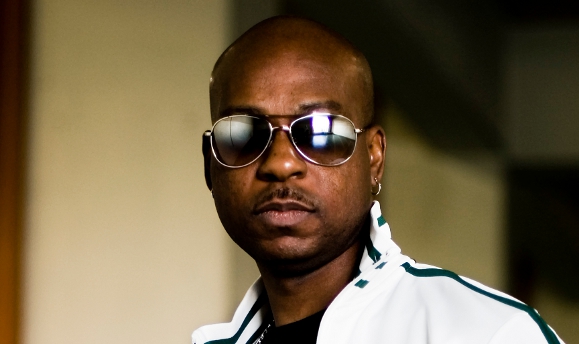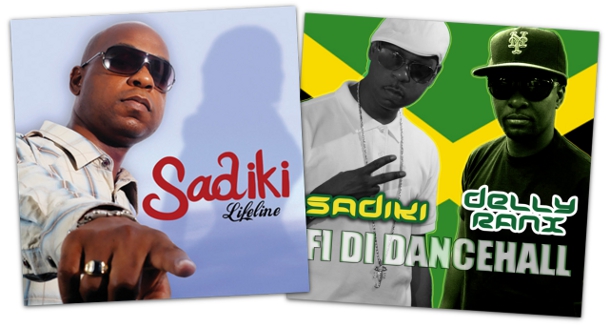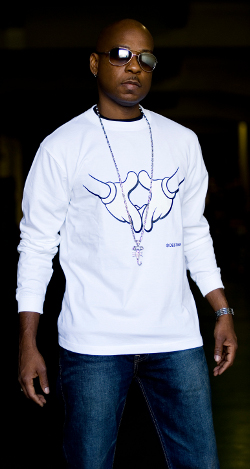Articles about reggae music, reviews, interviews, reports and more...
Interview: Sadiki
- Home
- Articles
- Interviews
- Interview: Sadiki

Interview: Sadiki
"Reggae music will always be a Jamaican art-form if Jamaicans embrace it"
Sampler
Henry "Sadiki" Buckley Junior is an artist who has stayed under the hype radar while building up an impressive body of work. He's a singer/producer in the tradition of Beres Hammond (with whom he recorded and toured early in the last decade) who has travelled between Jamaica and the United States in the course of his career. His father was both a songwriter to Judy Mowatt and - recalling the musical/policing path of pioneering producer Duke Reid - was conductor of the Jamaica Constabulary Force band. Henry Junior left his father behind and moved to Chicago in his teens, where he was inspired by hip hop and local talent like the then burgeoning R Kelly. A 1997 album as Pancho Kryztal for Mercury subsidiary, Scratchie records (run by Deadly Dragon's Jeremy Freeman), was not supported by the parent label due to corporate politics. But Buckley was undaunted: moving back to Jamaica, changing his name to Sadiki and, ten years later, becoming literally "big in Japan" with his debut under the new moniker 'Morning's Come'. Last year he released the well-received lovers album 'Lifeline', which yielded a BBC World Beat number one song in a cover of 2 Face idibia's African Queen. Angus Taylor spoke to this affable, reflective artist in the run up to his February 8th release 'Fi Di Dancehall' with Delly Ranks...

You’ve given your lovers rock fans an album Lifeline with Joe Fraser Records, now you’re about to drop a dancehall combination album with Delly Ranks. How did you link with Delly, and what's the thinking behind these different sides to your music?
Delly and me go back to when we both dropped a track on the Red Bull & Guinness riddim. Then we recorded a song together called Girlfriend that was on my Morning's Come album and from there we held that connection and had a good vibe musically. As an artist I think it's important that you don't just paint in one colour. You wouldn't look at a great painter and expect him to paint in black and white. With my music I look at it the same way: whatever I'm feeling, the people need to be exposed to it whether that be reggae, dancehall or R&B. I'm just getting the colours out there for the world.
 As an artist I think it's important that you don't just paint in one colour. You wouldn't look at a great painter and expect him to paint in black and white
As an artist I think it's important that you don't just paint in one colour. You wouldn't look at a great painter and expect him to paint in black and white
I know you have some opinions on the whole reggae vs dancehall thing. Does the divide really exist?
I think if you're an authentic Jamaican who understands the culture then the answer to that question would be "yes". But if you asked the rest of the world they would tell you probably "no". As far as I'm concerned it all boils down to Jamaican music. As someone who comes out of the culture, reggae is a slower vibe whereas dancehall is more of an uptempo, electronic sound. But growing up the States and going to school they wouldn't even talk about "reggae" or if Shabba was doing dancehall or not - they'd just say, "That’s that Jamaican shit!" (laughs)
The whole reggae/dancehall/conscious/slack thing is complicated for a foreign person. Jamaican recorded music has always been showcased in the dancehall – and someone like General Echo was doing his thing years before the new sound went international. Also slackness is as old as mento. There were even a few quite obscene tunes in the 70s...
I was on YouTube the other day watching a song called [Soul Sisters] Wreck A Buddy. I was shocked because the lyrics sounded like what you'd typically hear on a so-called dancehall type of vibe! So there really is no divide - people sing what they feel over whatever beat. It's complicated but it's also simple. What makes it simple is it's a part of the culture. So when people try to neglect certain parts of the culture and embrace other parts, that might be great for the world to see, but many people understand that's just part of the culture. If you go to parts of the world where people are living outside naked some people in those countries are like, "could you put some clothes on before the people with cameras come?" (laughs) But that's a part of the culture and for some people that's something they'd go to that part of the world to see!
Does dancehall need cleaning up as some high profile artists have said?
Who is going to clean it up? When I grew up in the States listening to hip-hop older people would say "That’s crap". When you get to a certain stage of maturity there is a point where you start looking at what the younger people are doing and it's “crap” because it doesn't apply to you anymore, and a lot of people in positions of power right now might be at that stage in life. But going back to your question, I’m not really into censoring people from saying what they want to say but if there are lyrics that are directly inciting violence against innocent people then I'm definitely against that. The media and broadcasters have done well in the last couple of years to put a stop to those lyrics in areas where children could pick it up.
 I’m not really into censoring people from saying what they want to say but if there are lyrics that are directly inciting violence against innocent people then I'm definitely against that
I’m not really into censoring people from saying what they want to say but if there are lyrics that are directly inciting violence against innocent people then I'm definitely against that
You know your way around a studio but you’re also happy to let others produce and co-produce. Would you say you’re a collaborative person, and who is your favourite producer to work with?
Yes, I'm collaborative all the way. I have no issues with taking a backseat and let other producers come with fresh ideas. I've worked with a really great cast of producers: Tony Kelly who I did the Pancho Kryztal album with, Dave Kelly, Computer Paul, Beres Hammond. From a knowledge and hands on perspective Tony Kelly surprised me the most while from a technical and lyrical standpoint it was Beres Hammond. But if I had to choose one person it would be Tony.

You hit the BBC World Beat number one with African Queen. That must be nice given lovers rock began in Britain. But you’ve also updated it with Delly as Jamaican Queen for the new album...
It felt great. the funny thing about it is that song went to number one and I didn't know about for a month! I was on Facebook talking to DJ Warm n Easy from the BBC saying, "how's that song doing?" and he was like, "It's been at number one for a month". I was like, "What????". We'd always had the concept of doing some different remixes and Delly Ranks appeared around the same time, so I thought, "while this song's doing well outside of Jamaica I really want to push this song and open it up there" and so far it's doing really well. I don't know if it will be another number one but God is God, you know? (laughs)
You also finally released your Santa Claus tune [out on radio in 2009] for Christmas 2010. A lot of Christmas songs are quite sugary but you went deep with this one. Do you celebrate Christmas?
I am a believer in Christ so I celebrate Christmas. Santa Claus is not your typical Christmas Carol! It's one of those reality tunes asking Santa if he's going to come to the Caribbean soon because of what's going on with violence in a lot of our islands. I would compare it to the Santa Claus Tommy Cowan wrote where he asked Santa, "Do you ever come to the ghetto?"
 My father never wanted any of his children involved in the music business. He pushed us far away from that. But what he failed to do was turn off the radio stations!
My father never wanted any of his children involved in the music business. He pushed us far away from that. But what he failed to do was turn off the radio stations!
Your father was in the police but also a musician. How did he feel about your decision to follow him into music?
Yes he was the conductor and musical director of the Jamaica Constabulary Force band for about ten years but he was also a singer and songwriter. He wrote Silent River for Judy Mowatt as well as Emergency Call. So he did the policeman thing and then he had his night job! Growing up my father never actually wanted any of his children involved in the music business. He pushed us far away from that. But what he failed to do was turn off the radio stations with all the music, so we were exposed! (laughs) When we moved to the States we were separated for about ten years and I did not see my dad until he moved to New York. He was sick at the time so we went to see him and that was the first time he became aware that I was involved in music to that level (because at the time I was signed to Mercury Records and releasing by debut cd) and he was very pleased. Coming from him that was a real compliment.
When the album didn't do as well as you expected, how did you decide to start anew as Sadiki?
Music is a part of my fibre. My music wasn't dependent on that album - or any project - succeeding. After the Pancho Kryztal album didn't work out I had some good connections through Tony Kelly and Dave Kelly so I decided to go to Jamaica.  The name change came about through Computer Paul. That was in about 1998 or 99. At the time there was a deejay using the name Pancho who was starting to make some waves and I didn't want people to get confused. Computer Paul came up with the name and said it means "the great one". But I said to Paul, "I'm just coming up so I don't want that name deh!" (laughs) But I did some research and found out it actually means, in Muslim culture, "one who is faithful" so I thought, "I can work with that name!"
The name change came about through Computer Paul. That was in about 1998 or 99. At the time there was a deejay using the name Pancho who was starting to make some waves and I didn't want people to get confused. Computer Paul came up with the name and said it means "the great one". But I said to Paul, "I'm just coming up so I don't want that name deh!" (laughs) But I did some research and found out it actually means, in Muslim culture, "one who is faithful" so I thought, "I can work with that name!"
How did your album Morning's Come get so big in Japan?
We did a mixtape called the Sound Killachi which was just a street thing. Then I went and did a four or five city tour on the strength of that mixtape and a label approached us and decided to give me a deal. The scene in Japan is really active. Every time I look at what's happening I feel so good as a Jamaican because our culture is affecting so many people. It's the same worldwide but I say Japan specifically because of how far reaching it is and the number of people emulating the culture.
 Music is a part of my fibre
Music is a part of my fibre
There's been a lot of concern in the Jamaican media about this phenomenon lately. Fears that foreign countries now have their own reggae and that Jamaica is being left out of the worldwide reggae market.
Reggae music will always be a Jamaican art-form if Jamaicans embrace it. And not just embrace one side of it but all things within the art-form. We can even speak about ska in that regard. I was talking to a couple of different people here in the States and when I mentioned ska as a Jamaican art-form they were surprised! I think for us as Jamaicans, instead of looking and debating so much about how the world sees us we need to start thinking about how we can push our music forward and embrace it more. Because if we don't do that, other people are going to do that for us. You can't blame someone for stepping in and doing what needs to be done. This is an art-form that is supposed to spread through the world. Japanese reggae, French reggae, UK reggae - I think it's great. It moves the culture, the people and our country forward, so long as we as Jamaicans own up and take ownership of the music. Stop worrying about how the world is viewing the thing and grasp it!
 The scene in Japan is really active. Every time I look at what's happening I feel so good as a Jamaican because our culture is affecting so many people
The scene in Japan is really active. Every time I look at what's happening I feel so good as a Jamaican because our culture is affecting so many people
Finally, you've done a lovers album, you've done a dancehall album. Is Sadiki going to drop a roots album?
(big laugh) That's a very good question! Keep checking the pages of United Reggae and the iTunes store! I have a whole heap of things to say and I haven't even started speaking my mind! Trust me! It's funny because someone said on iTunes about Lifeline that I can't have a song like Here I Am To Worship and a song like Make Up Sex on the same album - I don't agree with that. Maybe there will be a more rootsy album - to be quite honest the tracks are already there! But whether or not I choose to make them all one type of album or just put them among various types of tracks, we'll see!
Read more about this topic
Read comments (2)
| Posted by Lady British on 02.14.2011 | |
| This was a good read. He intrigues me | |
| Posted by DweetSweet on 02.14.2011 | |
| Amazing voice! Amazing talent! Great music! Just loving him | |
Comments actually desactivated due to too much spams
Browse by categories
Recommended Articles
Latest articles
Recently addedView all
© 2007-2024 United Reggae. All Rights Reserved. Reproduction in whole or in part is prohibited. Read about copyright
Terms of use | About us | Contact us | Authors | Newsletter | A-Z















